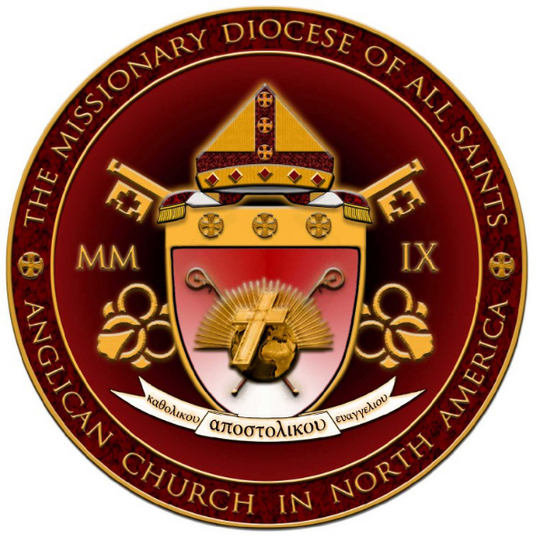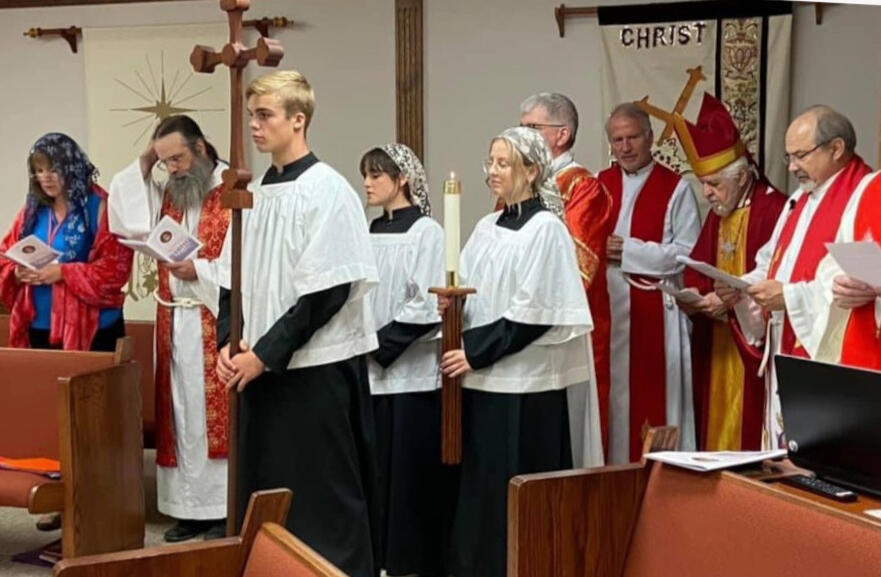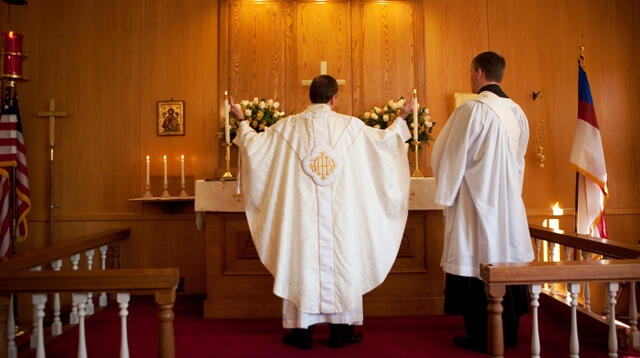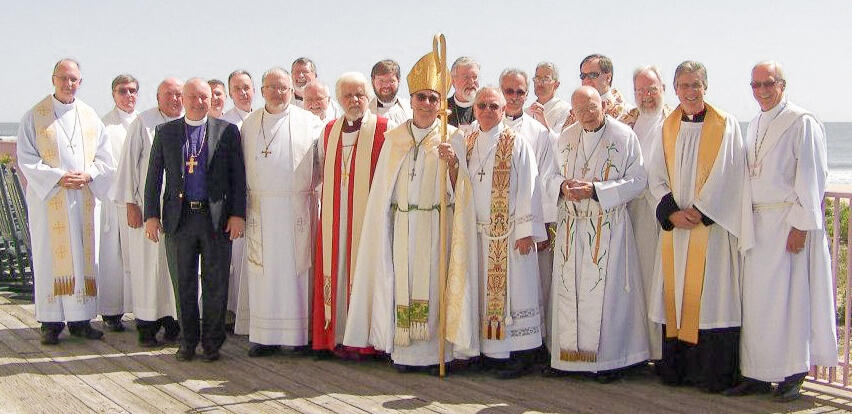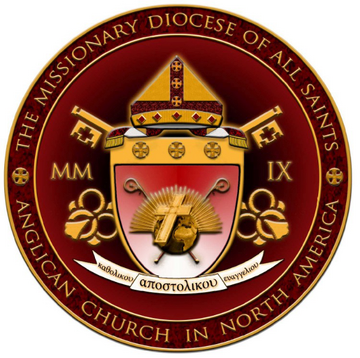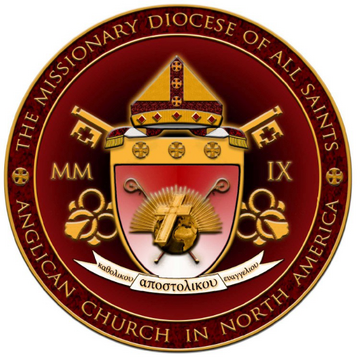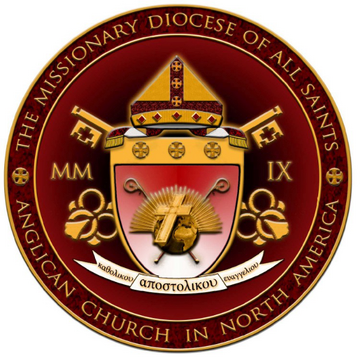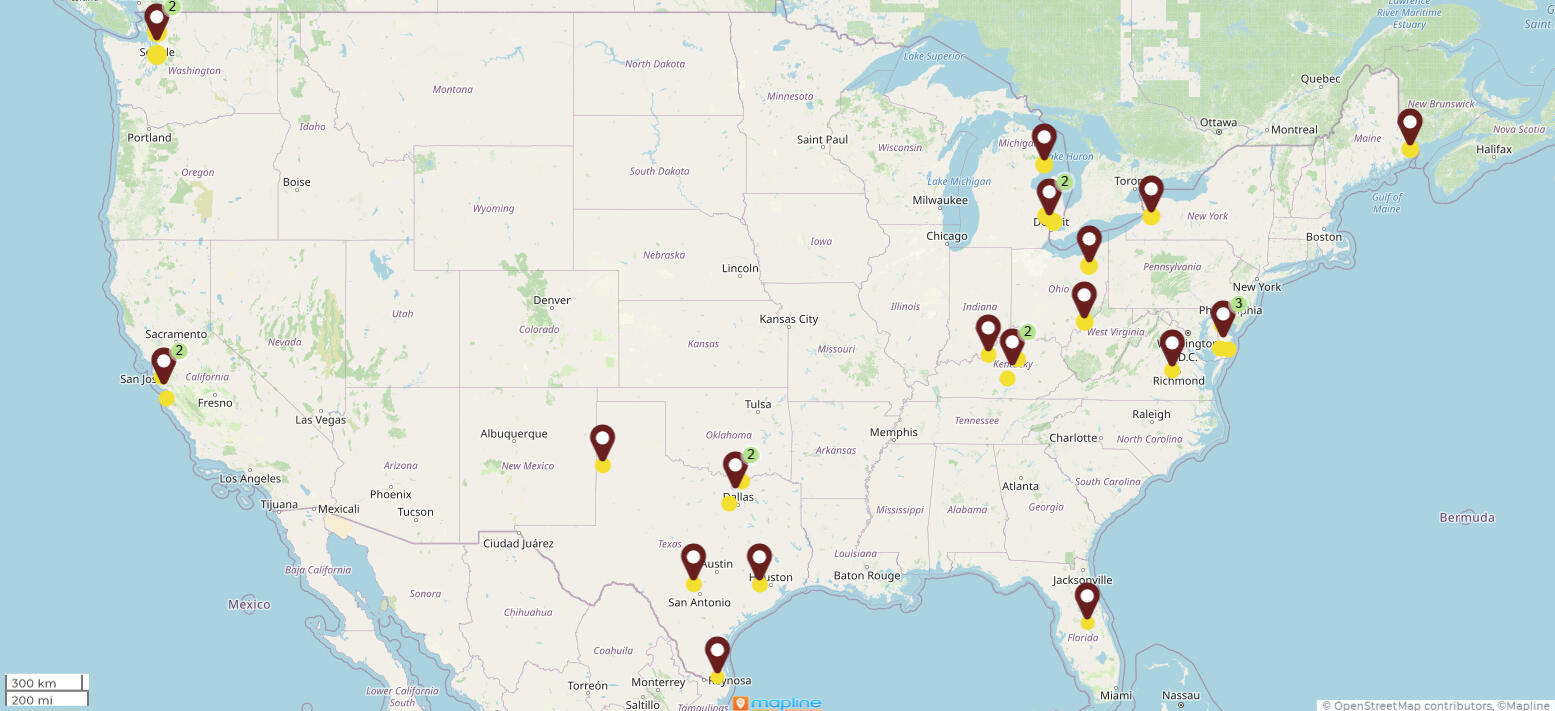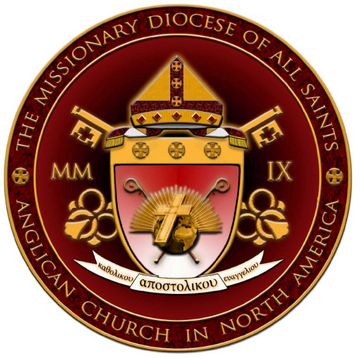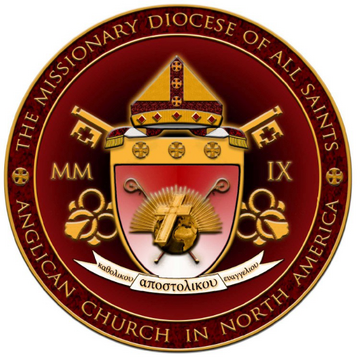Missionary Diocese of All Saints
Bishop Coadjutor Nomination
Whether you are here to nominate a candidate, are considering nomination yourself, or simply want to learn more about the process of electing a new bishop coadjutor, we appreciate you taking the time to be here.
Almighty God, giver of every good gift: Look graciously upon Thy Church, and so guide the minds of those who shall choose a Bishop Coadjutor for the Missionary Diocese of All Saints that we may receive a faithful pastor who will preach the Gospel, care for Thy people, equip us for ministry, and lead us forth in fulfillment of the Great Commission; through Jesus Christ our Lord. Amen.
If you are seeing this, that means you need to turn on Javascript, or else the entire site will appear, messily, as one page.
Bishop Profile
As we seek the Bishop Coadjutor who will become the Third Bishop Ordinary for The Missionary Diocese of All Saints when Bishop Lipka retires, we take note that the 2019 Prayer Book service for the ordaining and consecrating of a bishop has the Archbishop saying:
Brother, the Holy Scriptures and the ancient Canons command that we should not be hasty in laying on hands and admitting any person to authority in the Church of Christ, which our Lord purchased with no less price than the shedding of his own blood; so before we admit you to this Office, we will examine you, in order that this Congregation may know how you will conduct yourself in the Church of God.
Long before the Archbishop examines you in the context of that service, we ask you to examine yourself in light of the needs of the Missionary Diocese of All Saints. We ask you to do so deliberately, prayerfully, and with the help of godly fellow believers whom you trust. To help you with your discernment process, we offer the following priorities developed by clergy and laity from across our Diocese.
We desire a bishop who loves God, has a rich personal relationship with him, and is an able preacher and teacher.
Like Jesus who only did what he saw the Father doing, our new bishop will be practiced in seeking God and following his direction.He should have a deep knowledge of the Bible and the Book of Common Prayer. Our bishop should be a godly and prayerful man who seeks to model that deep relationship with God to all he encounters. He will trust in the present-day work of the Holy Spirit and encourage us to seek both the gifts and the fruit of the Holy Spirit in our lives.
We desire a bishop who listens well and is personally interested in getting to know us.
The clergy in particular need an advocate and friend who is fair minded and remembers the challenges of ministry – especially in smaller congregations and missions. We want a bishop who can support all of our clergy while also seeking to work well with other Dioceses who do not hold our positions, who will participate fully in the College of Bishops, and also work with Forward in Faith. It is our preference that the bishop will serve in some capacity within a parish of our Diocese, when not tending to duties of the office of bishop. The laity in particular have asked for a bishop who truly has a heart for all of the people he leads and will invest time in seeking to know us all in our varied parish settings in some form or manner.
We desire a bishop who affirms the three streams of the Christian Faith (Catholic, Evangelical, and Charismatic) as expressed in the Early Church.
Although bound together by our commitment to catholicity affirmed in our participation in Forward in Faith, we are a diocese with diverse expressions of public worship. We desire a bishop whose ministry demonstrates that he is open to and supportive of the various expressions of these three streams. He must be able to support his clergy and congregations in a variety of Anglican expressions/churchmanships and joyfully participate in worship with them.
We desire a bishop whose passion for the Gospel will lead us forward in growing our churches and who will actively support all of our ministry efforts to evangelize the lost and sanctify the saved.
Since we are “Missionary” in nature, it is our desire that our new bishop should devote a portion of his time to building up existing churches while also seeking to raise up church planters from among us to go out and reach the unchurched. Our bishop’s love for all should be evident to all with whom he interacts. His commitment of time and resources in his current parish should reflect this. He will work with the clergy and lay leaders to reach and disciple all people throughout our Diocese as we seek to make disciples who make disciples. He will look for and encourage men who may be called to ordained leadership and personally encourage them as they seek God’s leading.
We desire a bishop who understands the necessity of building consensus and who is an able Administrator who can also delegate when needed.
Take a moment to consider your own parish leadership style. Is there a broad consensus among your people for the direction you are leading? Do you gather many perspectives before coming to a decision affecting everyone? Have you tapped into the gifts of a wide variety of people in your parish to achieve that shared vision? Do you identify and train leaders who can raise up others? Are you faithful in following through on plans and promises? To put things plainly: Once the vision is affirmed, are you self-disciplined and organized enough to see that the job gets done? Are you willing to delegate authority and use the skills and talents of those around you, especially in areas where you know you are weak? In delegating will you utilize the fullness of the office of the Canon Ordinary and the Vicars-General of the three Convocations to help you in your office of the bishop in seeking to provide care, support, and guidance to the diocese?
We desire a bishop who will hold to and support the strong Anglo-Catholic roots and traditions of the Missionary Diocese of All Saints.
Our diocese was founded out of Forward in Faith and holds true to the ancient Catholic tradition within Anglicanism. Our bishop must be an active member of Forward in Faith, as the bishop also serves as the Vice President of Forward in Faith. As such the bishop must work to encourage and support the work of Forward in Faith in and amongst all members of the diocese.
We desire a bishop who is resilient and disciplined in body, mind, and spirit.
As bishop, you will serve congregations spread out across the nation with often vast distances from one congregation to the next. It may seem that you are always either on a phone call, Zoom call, or traveling by car or air, and this can be challenging at times. Be honest, are you in good physical and mental health and capable of providing Episcopal and Pastoral oversight for such a diocese as ours? Along with a lively devotional life, have you developed a core group of prayer partners whom you can rely on and with whom you can share your deepest burdens? Are you in this for the long haul?
All the above is our ideal in addition to the essential and primary qualifications as laid out in Holy Scripture.
We seek a bishop who truly embodies the spirit of godly leadership found in 1 Timothy 3, Titus 1, and in the 2019 Book of Common Prayer concerning the consecration of a bishop, specifically the examination on pages 499 & 502-507. As a bishop is consecrated for the whole church, we ask that our bishop truly embody these principles to the best of his ability.
Now that you have a better grasp of our priorities, we ask you to consider the following: Does the thought of leading us forward in mission and ministry bring a thrill to your heart? If you are married, does your wife feel the same way? Do you truly have the gifts and experience necessary, and does your ministry at present bear this out? If so, we earnestly invite your application, and we joyfully look forward to taking the next steps together. Whether God says no somewhere along the way, or he calls you to that examination before the Archbishop on the day of your consecration, know that we are deeply honored you are testing this calling. May we all hear God’s voice clearly. Our prayers are with you.
Diocesan Profile
Overview
The Missionary Diocese of All Saints (MDAS) was established out of Forward in Faith North America to help fulfill the Great Commission and Great Commandment of our Lord and Savior Jesus Christ, through the guidance and power of the Holy Spirit, and in steadfast commitment to the “faith that was once for all entrusted to the saints.”As Anglicans we are raising up disciples who are committed to evangelical and catholic truth, apostolic order, and godliness. In obedience to Christ’s mission we are planting churches where the Word is truly preached and heard and the Sacraments faithfully administered and faithfully received.As members of Forward in Faith North America, “Our fellowship works, prays, and witnesses for reform and renewal of the Church with no compromise of truth and no limitation of love. Our fellowship includes faithful Anglicans spanning many parishes, convocations, societies, and structures with the mission to witness to the faith and order of the undivided Church.”As missionaries sent to advance God’s Kingdom, the MDAS seeks the transformation of individual lives and communities, and the formation of new churches in North America and beyond, through the power of the gospel of Jesus Christ.
A LOOK AT THE NUMBERS
The Missionary Diocese of All Saints is a non-geographical diocese stretching to the four corners of the contiguous United States. The diocese contains 28 parishes in 14 states that are separated into three administrative “Convocations” - west, central, and east - each of which contains a roughly equal number of parishes.Serving the diocese are a total of 88 members of the clergy - 4 bishops, 1 active but retiring and 3 currently retired/inactive; 66 priests; and 18 vocational deacons. These clergy lead the worship for approximately 1000 worshippers in parishes and missions ranging in size from 3-4 on a Sunday to as many as 50-60.We have parishes founded as recently as 2022 and as old as pre-Revolutionary America. The majority of our parishes have been founded in the last 25 years. Our communities use a variety of Prayer Books (1662, 1928, 1979, 2019 both Traditional and Contemporary language). Many of our parishes identify as “Anglo-Catholic” but some as “relaxed high church," others as "catholic charismatic," while still others as “Traditionally Anglican,” or "Three Streams."The diocesan budget for 2022 included actualized income of approximately $144,300, from pledges, offerings, and all other sources. Year end reports showed actual budget surplus and net income of approximately $21,300, despite tithing receipts actualizing only approximately 82% of pledges. Estimates of 2023 tithing income pledged to the diocese currently anticipate an increase of approximately 2% over 2022 tithe receipts and year end estimates anticipate a budget surplus of approximately $10,600.
A REVIEW OF IMPORTANT ISSUES
Geographic size: The diocese is large, with churches from Florida to Washington, and California to Maine. Our size, compounded with the challenges of COVID travel restrictions and unexpected health issues of our current bishops, has disrupted regular episcopal visitations to our parishes.
Size of parishes: Many of the parishes in the diocese are small and the members are ageing. Some of our churches do not have anyone under the age of 55. The parishes are interested in strategies that promote continuity and growth and communication with other parishes.
Finances: Related to the size issue, many of the parishes operate on small budgets, and consequently the diocese operates on a small budget as well.
Catholic discipleship: As Christianity disappears from American culture, many believers need instruction in basic Christian beliefs as well as guidance into ways of Christian living. Members with backgrounds in other church traditions need instruction in what is distinctive about Anglicanism.
Relations with like-minded Dioceses: Limitations on travel have impeded collegial relationships among dioceses within ACNA, both for clergy and for lay members. Also, many members have only limited knowledge of developments in the wider Anglican world.
Engaging younger generations: This perennial issue is becoming more acute as fewer young people are receiving Christian instruction at home. Areas with growing immigrant populations face additional cross-cultural challenges.
EXCITING ASPECTS OF MDAS
Despite these potential challenges there are some incredible things going on!
Diocesan growth
We have several churches that have started in just the last 8 years and have been growing at a healthy pace with members ranging from newborn to retiree. There are churches in the process of joining our diocese as well as churches which have indicated an interest in doing so. We continue to offer a home for communities wishing to participate in our Anglican Catholic faith and ministry.
Church demographic
Many of our newer churches are made up of totally new Anglicans - and many totally new Christians. Some of our churches have a very diverse ethnic membership, and others include a significant first-generation immigrant membership.
Raising up leaders
We have newly established distance learning leadership and diaconal formation programs working with younger men across the country. These programs prepare them to help us lead our missionary expansion in their own communities without them having to sacrifice their jobs or significant vacation time.
The Church in the world
Among our churches we have a ministry with people in mental health crisis; an after-school program with at-risk children and their families; a free medical clinic; a K-6 elementary school; a ministry with asylum seekers at the southern border; ministries with the homeless; as well as various local and international partnerships and missions.
Evangelical faith
Many ordained and lay people alike throughout our diocese can be found throughout the week acting as the Church and living out their faith in small but impactful ways. Lay people are opening their homes to pray morning and evening prayer. Parishes are providing for people in need through Spirit-led almsgiving, beyond their usual weekly tithe. Traditional fasts and feasts are observed communally.
Catholic order
While there is diversity in the expression of Anglican spirituality and worship in local communities, the diocese maintains in common an upholding of the apostolic faith and Catholic order ("what has been believed everywhere, always, and by all”) as defined in the Forward in Faith Declaration of Purpose. This is proclaimed and experienced in our local worshiping communities regularly, from birth until death, as we receive grace through baptism, Holy Eucharist, confirmation, marriage, ordination, confession & reconciliation, and unction.Because of this theological and sacramental consistency across the diocese, we have enjoyed dialogue with other catholic groups, both Old Catholic and Anglican; namely, those in the Union of Scranton and the G3 Continuing Anglican churches, many of the latter are fellow Forward in Faith members.Despite the assaults of the world, the flesh, and the devil, we continue to stand firm as we hold fast to the traditions that we were taught. (cf. 2 Thess. 2:15)
Summary of Episcopal Requirements
To be eligible for the office of bishop, an individual must meet the requirements set out by Scripture, the Constitution and Canons of the ACNA, and the Missionary Diocese of All Saints (MDAS).
Biblical Requirements
“The saying is trustworthy: If anyone aspires to the office of overseer, he desires a noble task. Therefore an overseer must be above reproach, the husband of one wife, sober-minded, self-controlled, respectable, hospitable, able to teach, not a drunkard, not violent but gentle, not quarrelsome, not a lover of money. He must manage his own household well, with all dignity keeping his children submissive, for if someone does not know how to manage his own household, how will he care for God's church? He must not be a recent convert, or he may become puffed up with conceit and fall into the condemnation of the devil. Moreover, he must be well thought of by outsiders, so that he may not fall into disgrace, into a snare of the devil.
Deacons likewise must be dignified, not double-tongued, not addicted to much wine, not greedy for dishonest gain. They must hold the mystery of the faith with a clear conscience. And let them also be tested first; then let them serve as deacons if they prove themselves blameless. Their wives likewise must be dignified, not slanderers, but sober-minded, faithful in all things. Let deacons each be the husband of one wife, managing their children and their own households well. For those who serve well as deacons gain a good standing for themselves and also great confidence in the faith that is in Christ Jesus.”
“This is why I left you in Crete, so that you might put what remained into order, and appoint elders in every town as I directed you— if anyone is above reproach, the husband of one wife, and his children are believers and not open to the charge of debauchery or insubordination. For an overseer, as God's steward, must be above reproach. He must not be arrogant or quick-tempered or a drunkard or violent or greedy for gain, but hospitable, a lover of good, self-controlled, upright, holy, and disciplined. He must hold firm to the trustworthy word as taught, so that he may be able to give instruction in sound doctrine and also to rebuke those who contradict it.”
“So I exhort the elders among you, as a fellow elder and a witness of the sufferings of Christ, as well as a partaker in the glory that is going to be revealed: shepherd the flock of God that is among you, exercising oversight, not under compulsion, but willingly, as God would have you; not for shameful gain, but eagerly; not domineering over those in your charge, but being examples to the flock.”
Constitution and Canons of the ACNA and MDAS
"The Bishop of the Diocese or Bishop Coadjutor “shall be the chief pastor of all the members of the Church in this Diocese and the President of the Diocesan Synod. He shall make or provide for at least one Episcopal visitation to each parish and mission every two years, shall have the right to summon and attend meetings of parishes and missions within his jurisdiction and shall be ex officio a member of all diocesan committees and agencies.”
Title III Canon 8 Sec. 1 (ACNA)
“A Bishop is called by God and the Church to be a shepherd who feeds the flock entrusted to his care. A Bishop is an overseer of the flock and as such is called to propagate, to teach, and to uphold and defend the faith and order of the Church willingly and as God wants him to – not greedy for money, but eager to serve; not lording it over those entrusted to his care, but being a wholesome example to the entire flock of Christ (1 Peter 5:2-3). These requirements are in addition to the requirements set forth in Canon 2 for Deacon (1 Timothy 3:8-13) and for Presbyter (1 Timothy 3:1-7; 5:17; Titus 1:6-9).”
Title III Canon 8 Sec. 2 (ACNA)
“By the tradition of Christ’s One, Holy, Catholic, and Apostolic Church, Bishops are consecrated for the whole Church and are successors of the Apostles through the grace of the Holy Spirit given to them. They are chief missionaries and chief pastors, guardians and teachers of doctrine, and administrators of godly discipline and governance.”
Title III Canon 8 Sec. 3 (ACNA)
To be a suitable candidate for the episcopate, a person must:
1. Be a person of prayer and strong faith;
2. Be pious, have good morals and exhibit Godly character;
3. Have a zeal for souls;
4. Have demonstrated evidence of the fruit of the Holy Spirit;
5. Possess the knowledge and gifts which equip him to fulfill the office;
6. Be held in good esteem by the faithful;
7. Be a male Presbyter at least 35 years old;
8. Have demonstrated the ability to lead and grow the Church.
Guidelines Set by the Standing Committee of MDAS
The Standing Committee of the diocese established the following guidelines for the search committee to follow in the search and nomination process.
These are the expected qualifications for service as a bishop of our diocese as well as the Vice President of Forward in Faith.
If you have questions about any of the guidelines, or have concerns about whether the person you wish to nominate meets these qualifications, please contact the Search Committee.
The process must be conducted in accordance with the Archbishop’s Customary for the Diocesan Election of a Bishop (Appendices 1 and 2) and the Constitution and Canons of the Missionary Diocese of All Saints (Constitution, Article 8; and Canon 3, Section 1).
All nominees must meet the requirements for a Bishop as outlined in 1 Timothy 3:1-7 and Titus 1:5-9 and be able to conform to the requirements of Bishop as stated in the Book of Common Prayer (2019) in the questions of Examination (pp. 503-504) and the exhortation at the presentation of the Bible (p. 507).
All nominees must be a bishop or priest in good standing in the Anglican Church in North America.
All nominees must have served as a Vicar/Rector in a Mission/Parish for at least three years and receive a favorable recommendation to serve as Bishop from the Vestry or governing body of that Mission/Parish.
If the nominee is not already canonically resident within the Missionary Diocese of All Saints, a letter of recommendation must be received from the Ordinary of the Diocese in which he serves.
All nominees must be members of Forward in Faith for at least five years.
All nominees must have an orthodox, catholic, and biblical worldview.
All nominees must affirm all three streams of the Christian Faith (Catholic, Evangelical, and Charismatic) as expressed in the Early Church and renewed in these Latter Days regarding worship in the Diocese.
Archbishop’s Customary
The individual must be willing to sign the following covenant with the ACNA College of Bishops, if he should be elected:
Will attend all College of Bishops, Provincial Council/Assembly meetings unless given permission by the Archbishop to be excused.
Will accept at least one appointment to serve on a College of Bishops committee.
Will subscribe to Covenant Eyes and have it installed on all of his personal and office cell phones, computers and tablets.
Will promote discipleship, church planting, and evangelism as primary values and function of the diocese.
Will attend all Gafcon/Global South Bishops conferences unless given permission by the Archbishop to be excused.
Will accept at least one partnership with a Gafcon/Global South bishop and diocese.
Will honor the College of Bishops agreements explaining how overlapping jurisdictions deal with church planting, transfers, and admitting new congregations.
Will teach and encourage the 10/10/10 principle of giving (10% from individuals to church, church to diocese and diocese to Province) and call upon the diocese to tithe to the ACNA unless given permission by the Archbishop for a different arrangement.
The Examination in the 2019 BCP
Do you believe that the Holy Scriptures contain all things necessary for salvation through faith in Jesus Christ? And are you determined out of the Holy Scriptures to instruct the people committed to your charge, and to teach or maintain nothing as necessary to eternal salvation but that which may be concluded and proved by the Scriptures?
I do so believe, and I am so determined, the Lord being my helper.Will you then faithfully study the Holy Scriptures, and call upon God by prayer for the true understanding of them, so that you may be able by them to teach and exhort with wholesome doctrine, and to withstand and convince those who contradict it?
I will, the Lord being my helper.Are you ready, with all faithful diligence, to banish and drive away from the Church all erroneous and strange doctrine contrary to God’s Word, and both privately and publicly to call upon others and encourage them to do the same?
I am ready, the Lord being my helper.Will you renounce all ungodliness and worldly lusts, and live a godly, righteous, and sober life in this present world, that you may show yourself in all things an example of good works for others, that the adversary may be ashamed, having nothing to say against you?
I will, the Lord being my helper.Will you maintain and set forward, as much as you are able, quietness, love, and peace among all people, and diligently exercise such discipline as is, by the authority of God’s Word and by the Order of this Church, committed to you?
I will, the Lord being my helper.Will you be faithful in examining, confirming, ordaining, and sending the people of God?
I will, the Lord being my helper.Will you show yourself gentle, and be merciful for Christ’s sake, to poor and needy people and to all strangers destitute of help?
I will, the Lord being my helper.
(pp. 503-504)
Bishop's Exhortation at the presentation of the Bible:
Give heed to reading, exhortation, and doctrine. Think upon the things contained in this Book. Be diligent in them, that your growth in the grace and knowledge of our Lord Jesus Christ may be evident to all. In doing so you shall save both yourself and those who hear you. Be to the flock of Christ a shepherd, not a wolf; feed them, do not devour them. Hold up the weak, heal the sick, bind up the broken, bring back the lapsed, and seek the lost. Do not confuse mercy with indifference; so minister discipline, that you forget not mercy; that when the Chief Shepherd appears, you may receive the never-fading crown of glory; through Jesus Christ our Lord.
(p. 507)
Frequently Asked Questions
What is the timeline for the whole process to elect a Bishop?
From the timeline given by the Standing Committee.
| Date | Stage |
|---|---|
| June 14, 2023 | Open nomination process |
| Sept. 15, 2023 | Close nominations |
| Sept - Nov. 2023 | Interviews |
| Nov 2023-Jan. 2024 | Finalize list of candidates |
| Feb. - March 2024 | Announce final candidates publicly |
| March - April 2024 | Virtual meetings of candidates with clergy and lay representatives across the diocese |
| April 2024 | Hold Synod to elect bishop coadjutor |
| June 2024 | Bishop-elect sent to College of Bishops for their consent |
| Sept. - Oct. 2024 | New bishop is consecrated/installed (Archbishop’s office will schedule this) |
Who will review and vet the nominations and applications?
Names were submitted to the Vicar-General of each of our Convocations. Those names were then submitted to the Diocesan Standing Committee. From those names a combination of 9 clergy and lay representatives were chosen. This group will review nominees, vet them, screen their qualifications, and interview potential candidates. From this, the Search Committee will send forth the best 2 or 3 candidates for approval of the Standing Committee. The diocese will then vote from among these finalists at its Synod in April 2024.
| Title | Name | Ministry or Parish | City, State |
|---|---|---|---|
| Very Rev. Fr | Larry Barnhill, | Dean, Holy Trinity Cathedral | Berlin, MD |
| Very Rev. Fr | Harley Crain | St Barnabas | Shoreline, WA |
| Mrs | Gloria Dzambo | Holy Trinity Cathedral | Berlin, MD |
| Rev. Fr | Jonah Kelman | Anglican.Center (Nonparochial) | Santa Cruz, CA |
| Mr | Karl Oles | St Barnabas | Shoreline, WA |
| Mr | Nicholas Smith | Holy Cross | Kent, OH |
| Mrs | Cassandra Strubler | Church of the Advent | Lake Orion, MI |
Who may nominate potential candidates?
Anyone may suggest a nominee for Bishop. Candidates must be a priest or bishop in good standing. We also ask that you visit our information page to ensure an accurate understanding of our requirements and desires for our next Bishop. Once this is done, you can submit your nomination here.
What are the qualifications for nominees to be Bishop?
The qualifications for Bishop are laid out in Holy Scripture, the Canons of our Province and Diocese, the Archbishop’s Customary, and the guidelines provided by our Diocesan Standing Committee. You can find a summary of all these things here.
What is the process that will be used to select the final candidates?
Once a pool of suggested nominees has been formed in accordance with what is listed in regard to qualifications, a review of resumes and paperwork will be done. From that the pool will be narrowed. Then a series of interviews, references, and background checks will be conducted. During every stage, the list of nominees will be prayed over by the Search Committee and the best 2 or 3 candidates will be submitted for approval to the standing committee and then to the diocese.
When will the final candidates be announced?
The Search Committee plans to have the nomination process completed and a list of final candidates ready for review by the diocese by March 2024.
When will the next Bishop be elected?
A General Synod of the entire diocese will be held April 2024 in which the election will take place.
How will the actual election of the new Bishop take place?
In accordance with Title 1, Canon 3. Section 4 of the Canons of the Missionary Diocese of All Saints, a general Synod will be held. Clergy and lay delegates from all three Convocations will meet to cast their votes. This voting will have a clear winner and that individual's name will be announced as the bishop-elect and will be forwarded to the College of Bishops for their review and approval.
When will the next Bishop be consecrated/installed?
After the election is completed, the bishop-elect will be sent to the College of Bishops of the ACNA. At that point, an invitation to present to the College of Bishops will be issued and the College of Bishops will either consent or disapprove of the Bishop’s election. If consent is given then the Archbishop will schedule the installation/consecration of the bishop-elect. It is the desire of the Search Committee that this take place in the summer of 2024. The date of consecration/installation will be scheduled by the Archbishop’s office.
Who will actually cast the ballots/votes for the new Bishop?
All clergy in the diocese who are in good standing, as well as retired and parochial clergy, along with lay delegates who are chosen by diocesan protocols to represent their parishes will be the people who shall have the authority to cast a vote for the election of the new Bishop. The guidelines for this are laid out in the Missionary Diocese of All Saints Constitution and Canons under Title 1 Canon 3 Section 4.
Can non-parochial and retired clergy vote?
Non-parochial and retired clergy are entitled to vote, as long as they are in good standing as determined by the bishop's office. They are encouraged to be a part of the nominating process in helping to name any potential candidate who they view as qualified.
